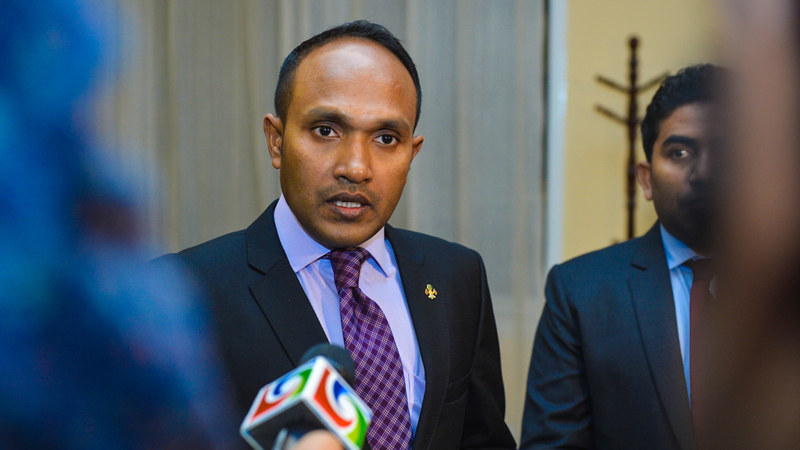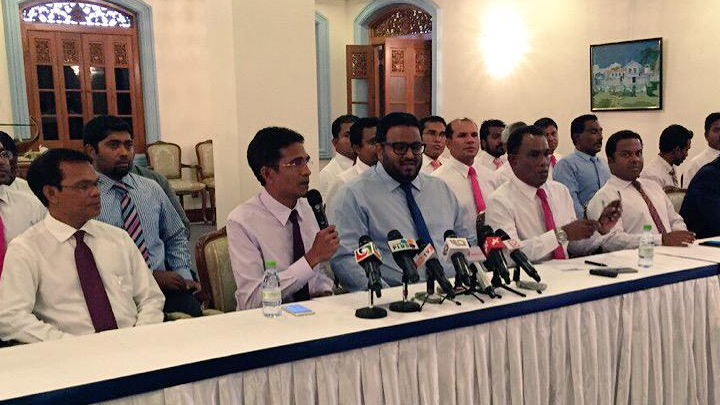This article was first published on Dhivehi Sitee. Republished with permission.
The first multiparty presidential election of 2008 in Maldives saw an end to the 30-year dictatorship of Maumoon Abdul Gayoom and the adoption of a modern democracy for the first time in the Maldives. Nevertheless, as in many other nascent democracies, there is real doubt whether Maldives can sustain its democracy in its fullest sense, especially after the recent coup that ousted the first democratically elected president in February 2012.
Some scholars argue that the mode of democratic transition a country experiences proves to be a critical factor in determining the country’s democratic future. Hence, an analysis of the mode of democratic transition that occurred in Maldives may help in predicting whether democracy could be sustained in future.
Political scientist Samuel Huntington argues that the process of democratisation could be determined based on ‘the relative importance of governing and the opposition groups as the sources of democratisation’.
He identifies three broader modes of democratisation; (1) ‘transformation’ (from above) occurs when the regime itself takes initiative in bringing democracy; (2) ‘replacement’ (from below) occurs when opposition groups take the initiative and replace the regime by bringing democracy; and (3) ‘transplacement’ (through bargain) occurs when both government and opposition work together to bring about democracy.
My aim here is to analyse the process of democratisation in Maldives in terms of the theories offered by Huntington, and identify the modes of democratic transition that occurred in Maldives.
This in turn may help predict the future sustenance of democracy in Maldives. I will argue that no one particular mode of democratisation occurred in Maldives as none of them materialised fully. However, various efforts from the current opposition Maldivian Democratic Party (MDP), together with the leadership of Mohamed Nasheed, have contributed significantly to the process and facilitated negotiations with the regime leading to democratisation.
To achieve the stated-aim, I will discuss the major events that contributed to the democratisation process in Maldives by relating them to the modes of transition outlined above.
The initial period of democratic struggle – a period of near ‘replacement’
The initial period of the struggle for democracy in Maldives depicts characteristics of ‘replacement’ where citizens started to challenge the regime through various means and made attempts to overthrow the autocratic government. The first serious challenge to dictator Gayoom was in 1988, with a failed coup attempt carried out by Sri Lankan Tamil mercenaries financed by wealthy Maldivians. A year after the attempted coup, the election of western-educated young politicians to the parliament in 1989 resulted in increased pressure for democratic reforms.
However, many of them and their family members faced significant threats from the regime and some of them were imprisoned for various politically motivated charges[3]. The regime continued to suppress major opposition figures through arbitrary arrests. In 2001, Mohamed Nasheed – both a Member of Parliament and a major opposition figure – was arrested and imprisoned for two and half years. The same year, the opposition MDP made their first attempt to formally register themselves as a political party. The Home Ministry, mandated to register civic organisations, sent the petition to parliament where it was overwhelmingly rejected.
On September 20, 2003, civil unrest broke out in the capital Male’ sparked by the death of prison inmate Hassan Evan Naseem. Evan was tortured to death by security forces during an interrogation. News of his death led to riots in the prison and a subsequent shootout by the police that killed three more inmates and injured many others. The news spread throughout Maldives, becoming the major trigger for many to publicly demand democratic reforms.
Since the September unrests, Gayoom came under tremendous pressure from both domestic and international actors that compelled him to announce democratic reforms. On June 2004, during an informal meeting, Gayoom announced his proposed changes to the Constitution including two term limits for the president, direct election of the president, measures to increase separation of powers and removing the gender bar for political participation. Moreover, he urged citizens to publicly debate his proposals. The opposition were still very sceptical about Gayoom’s real intentions and raised doubts about whether he could bring about concrete reforms.
However, the reform announcement itself facilitated the opposition to organise more activities publicly. Matt Mulberry from the International Center on Nonviolent Conflict, argues that the reforms announced by Gayoom ‘technically gave citizens freedom of speech and freedom of assembly’. As a result, some citizens organised a series of “minivan debates” (‘minivan’ means ‘independent’ in Dhivehi) where they discussed the political issues facing the country. Unsurprisingly, the government sent police to disrupt these debates, eventually declaring them illegal.
Despite these repressive actions, the opposition organised a huge protest on August 12-13, 2004 to mark the death of Evan Naseem and demanded reforms, including the release of political prisoners. A record number of citizens took part in the protest which became the largest political gathering ever in the history of Maldives at that time.
The crackdown that followed the protest led to the arrest of hundreds of activists and injured many protesters. As a result, violence erupted in capital Male’ and other parts of the country. Despite the oppressed media, news of the regime’s repressive actions attracted the attention of many international actors. By then, President Gayoom faced immense pressure from the UK, US, India and Sri Lanka to bring about political reforms.
From ‘replacement’ to ‘transplacement’ – a period of joint action
The mounting international pressure and political instability in Maldives led to a new phase in the democratisation process as the regime agreed to have serious negotiations with the opposition. The willingness of joint action from both the regime and the opposition led to a period of ‘transplacement’ in the democratisation process. The regime agreed to sit with the opposition for the first time in the UK.
During the negotiations, the regime agreed to more reforms including formation of independent oversight bodies such as the Police Integrity Commission and the Judicial Services Commission. Moreover, informal talks between reformers within the regime and the opposition were held in Sri Lanka facilitated by the British High Commissioner.
However, the lack of true commitments from the regime led the opposition to realise that international pressure alone would not help bring down the autocratic leadership. Hence, they increased their efforts in organising more protests, speeches and sit-ins. As a result of the mounting support for the opposition’s cause, reformers within the government increased their efforts in pressuring Gayoom to implement urgent reforms.
The pressure from a few reformers within the government and the opposition MDP led to a period of ‘transformation’ where the regime was compelled to take reform actions. In April 2005, the then Attorney General Dr Hassan Saeed overturned his predecessor’s decision by issuing a formal legal opinion to allow the registration of political parties. In June 2005, the parliament unanimously voted in favour of a resolution to allow multi-party democracy for the first time in Maldives. The MDP – the main opposition party – led by Mohamed Nasheed was formally registered, along with several other political parties representing different views. In March 2006, the regime published a roadmap that ‘included 31 proposals for revision of the Constitution, a series of time-bound commitments on human rights, and proposals to build institutions and mobilise civil society’.
However, many still doubted whether the regime was committed to real reforms. Ahmed Shaheed (then Foreign Minister) later argued that, through the reform agenda, Gayoom was seeking to get rehabilitated and thereby stabilise his presidency. He argued that, by 2007, Gayoom had achieved his aim by gaining widespread domestic support and getting rehabilitated.
However, new cracks that significantly weakened the regime emerged as those most closely associated with the reform agenda left the government. On 5th August 2007, both Dr Hassan Saeed and Mohamed Jameel (Justice Minister) resigned from their posts. They claimed that working outside Gayoom’s regime was the only option to advance their reform agenda. Later on the same month, Ahmed Shaheed resigned from the post of Foreign Minister, accusing the government of stalling democratic reforms. These developments saw more public support for the opposition reform movement. After several disagreements with the Special Majlis (Special Parliament), Gayoom ratified the new Constitution in August 2008, allowing key democratic reforms and paving way for the first multi-party presidential election in October that year.
Democracy sustainable?
As evident from the discussion above, three modes of democratisation have contributed to the democratisation process in Maldives, though characteristics of ‘transformation’ are very little. Interestingly, there appears to be a correlation between each mode as the occurrence of one type led to the other. This observation therefore contradicts Huntington’s view that the three modes of democratisation are alternatives to one another.
However, it is important to note the significant role played by the opposition MDP, especially Mohamed Nasheed as the leader who never took a step back in his quest to bring democracy to Maldives. It is clear that MDP played the most critical role in the process of democratisation. I have previously argued that Gayoom is the major obstacle to sustaining democracy and the threat is heightened more than ever with his current political activeness.
Reflecting on the process of democratisation and the strong influence of Gayoom on many institutions till today, I still doubt sustenance of democracy in the Maldives. Similar to the 2008 election, this year’s election is very much a choice between democracy and autocracy.
All comment pieces are the sole view of the author and do not reflect the editorial policy of Minivan News. If you would like to write an opinion piece, please send proposals to [email protected]
Likes (0)Dislikes
(0)Dislikes (0)
(0) 

